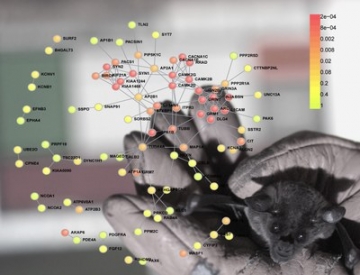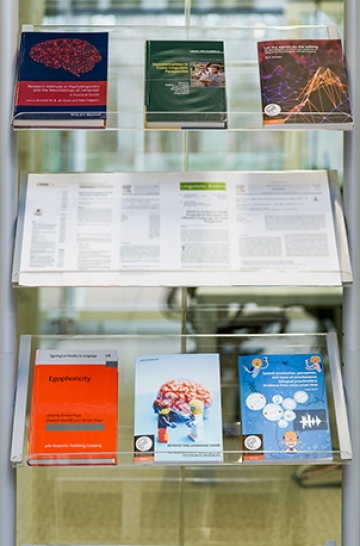Vocal communication in mammals and the evolution of human language
Our research group focuses on the study of vocal communication in mammals as a way to understand the biological basis of human speech and language and how this trait evolved.
Many species of mammal, including our primate cousins, have limited vocal repertoires. But a few mammals such as bats, whales and elephants use complex and varied vocalisations that share some characteristics with human speech, for example, the ability to learn vocalisations from other members of their social group.
Currently very little is known about the genetic basis for these sophisticated vocal behaviours in non-human mammals. Studying such species could provide clues about how human language evolved, and how language abilities are encoded in the brain and the genome.
Understanding the bases of vocal communication
As part of our quest to understand the neurogenetic bases of vocal learning and social-vocal communication, we devote particular attention to the study of bats. We use cutting-edge molecular techniques to identify genes and neural circuits that are important for vocal communication and learned vocalisations in this species. See our Projects page for more information about this research project (the Bat1K consortium).
We also investigate the causes of language disorders in clinical populations to gain insight into the causes of these disorders, but also to understand the genetic factors underlying normal language development.
Candidate genes identified in clinical populations are also explored in our animal models to understand what role they play and why their disruption leads to language-related disorders.
Contact
- Grants and awards
-
Max Planck Research Group (MPG) (2016 - 2020)
This 5-year research programme will fund a major research project to understand the genetic basis of vocal communication in mammals. By carrying out behavioural experiments in animal models and building large networks of the genes involved we will be able to gain a better understanding of the genetic contribution to communicative behaviour (such as learned vocalisations).
HFSP Research Grant (2016 - 2019)
This is a collaborative project with the LMU and TUM Munich and UC Berkeley to investigate the genetic, neurobiological and behavioural underpinnings of vocal learning in bats. Lead PI: Dr. S. Vernes
Marie Curie Career Integration Grant (CIG), EU (2013 - 2017)
A tangled web: FOXP2 and neuronal networks
This project investigates the role of Foxp2 in mouse neurons using model systems including in vitro cell models and ex vivo neuronal cultures. This project primarily focuses on neuronal phenotypes and network connectivity. The main goal of this project is to define the role of Foxp2 in developing neuronal circuitry.
Radboud University Medical Centre, research grant (2014 - 2018)Foxp2 and Language Related Neural Networks
This project investigates the function of Foxp2 in cortico-striatal circuits in the mouse brain. The main goal of this project is to understand the role of Foxp2 in the development neural circuitry and how mutations identified in language impairment patients affect these circuits.
-
 19 January 2022
19 January 2022Sonja Vernes to receive 2022 Blavatnik Award
Sonja Vernes, research group leader of the Neurogenetics of Vocal Communication Group at the Max Planck Institute for Psycholinguistics in Nijmegen, will be receiving a Blavatnik Award for Young...
-
 09 December 2020
09 December 2020ERC Consolidator Grant for Sonja Vernes
The MPI is proud and happy to announce that Sonja Vernes has been granted an ERC Consolidator Grant for her BATSPEAK project proposal. Vernes is an MPI Research Group Leader, she heads the...



Share this page